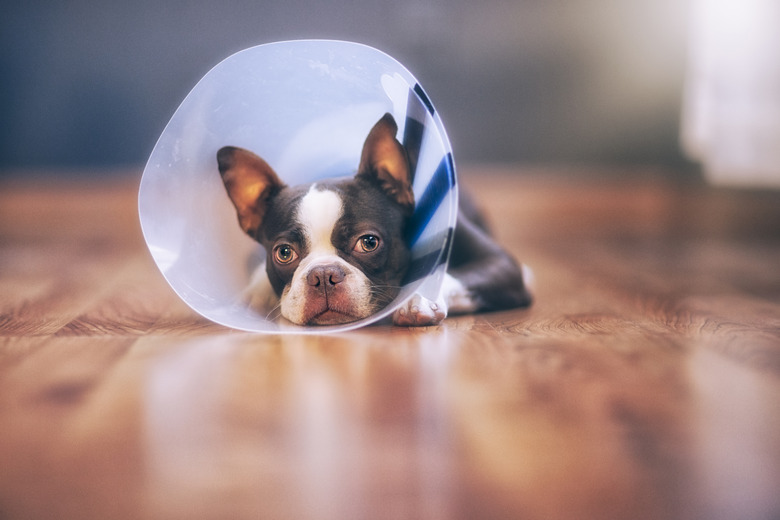How Long After Neutering A Dog Is The Testosterone Gone?
When it comes to frenzied hormones, dogs who aren't neutered have them in droves. If you have a male pooch and decide to take the step in getting him fixed, don't expect to see an instant drop in all of his hormonally charged behavioral patterns, however. The effects of neutering often take a little bit of time to fully kick in.
Neutering surgery
Neutering surgery
Neutering a dog at a veterinary clinic involves taking out his testicles — a castrating procedure. The testicles create sperm and also are responsible for the bulk of a dog's male hormones, which are known as testosterone. The goal of the surgery is to make the dog sterile and therefore unable to impregnate any female dogs. With the testicles out of the picture, male dogs' bodies have reduced amounts of testosterone — their predominant sex drive hormone.
Calming and neutering
Calming and neutering
If your unfixed pooch has a naturally enthusiastic, playful and fun disposition, The Humane Society of Harford County says neutering won't alter that in any way, so don't fret. He won't become a big bore. At the same time, Utah Vet Clinics explain that he might seem a lot calmer simply because his body isn't as driven by testosterone as it was previously. The instinct to mate and reproduce is intense in intact canines, that the Atlanta Humane Society says can lead to all sorts of restless, frantic and even aggressive actions, whether escaping from your backyard, partaking in physical fights with other dogs or marking with urine.
If your pet behaves in a much more laid-back manner after being neutered, it's not because his personality is suddenly transformed, it's because his mind isn't constantly on the look out for female dogs and mating. Instead, it's on you.
Time frame
Time frame
Neutering doesn't do away with hormonal behavioral patterns immediately. Patience is definitely necessary in these cases. It often takes a maximum of six weeks for the hormones to depart from a male dog's body. During that time period, he might not only still attempt to breed with female dogs, he might even be able to get them pregnant, too.
Because of that chance, it's important to keep recently neutered dogs away from any unfixed females for that six-week time frame. If your dog seems just as concerned and preoccupied as before with breeding for a few weeks after surgery, it's OK. A little time will take care of that.
Age and neutering
Age and neutering
If your pooch is still a young puppy, the American Humane Association suggests you might even be able to stop antsy and frenetic hormonal actions from ever even making an appearance. The ASPCA says that healthy puppies can be neutered when they are as young as 8-weeks-old, so discuss with your veterinarian the possibility of neutering your pooch before he hits "puberty," which often happens in dogs who are between 6 and 9 months old. According to the Humane Society of the United States, neutering prior to puberty, in many cases, halts the emergence of undesirable hormonal behavioral patterns. If your dog doesn't act hormonally in the first place, it won't take him any time to "calm down," after all.
References
- The Humane Society of the United States: Why You Should Spay/Neuter Your Pet
- American Humane Association: Spaying/Neutering
- The Humane Society of Hartford County: Spay & Neuter
- Utah Veterinary Clinics: Neutering is the Removal of the Male Dog's Testicles
- ASPCA: How Will Neutering Change My Dog?
- Atlanta Humane Society: Spaying and Neutering
